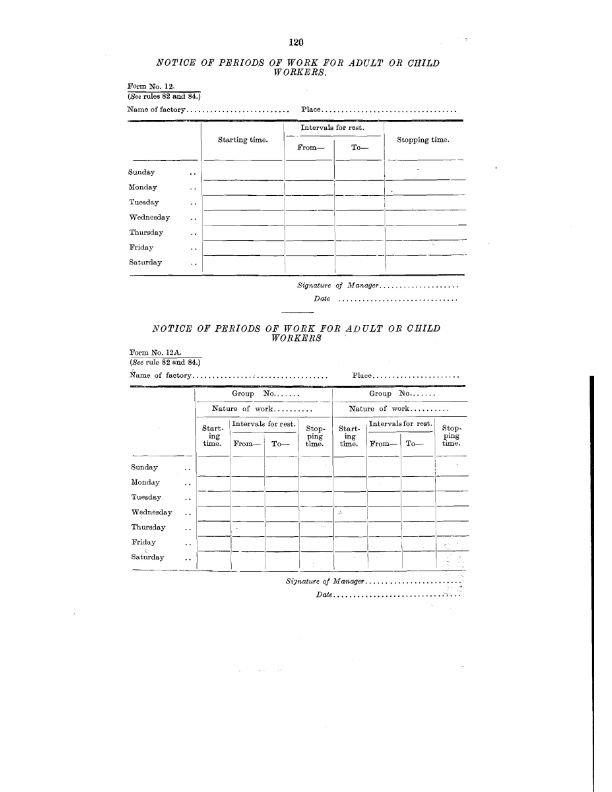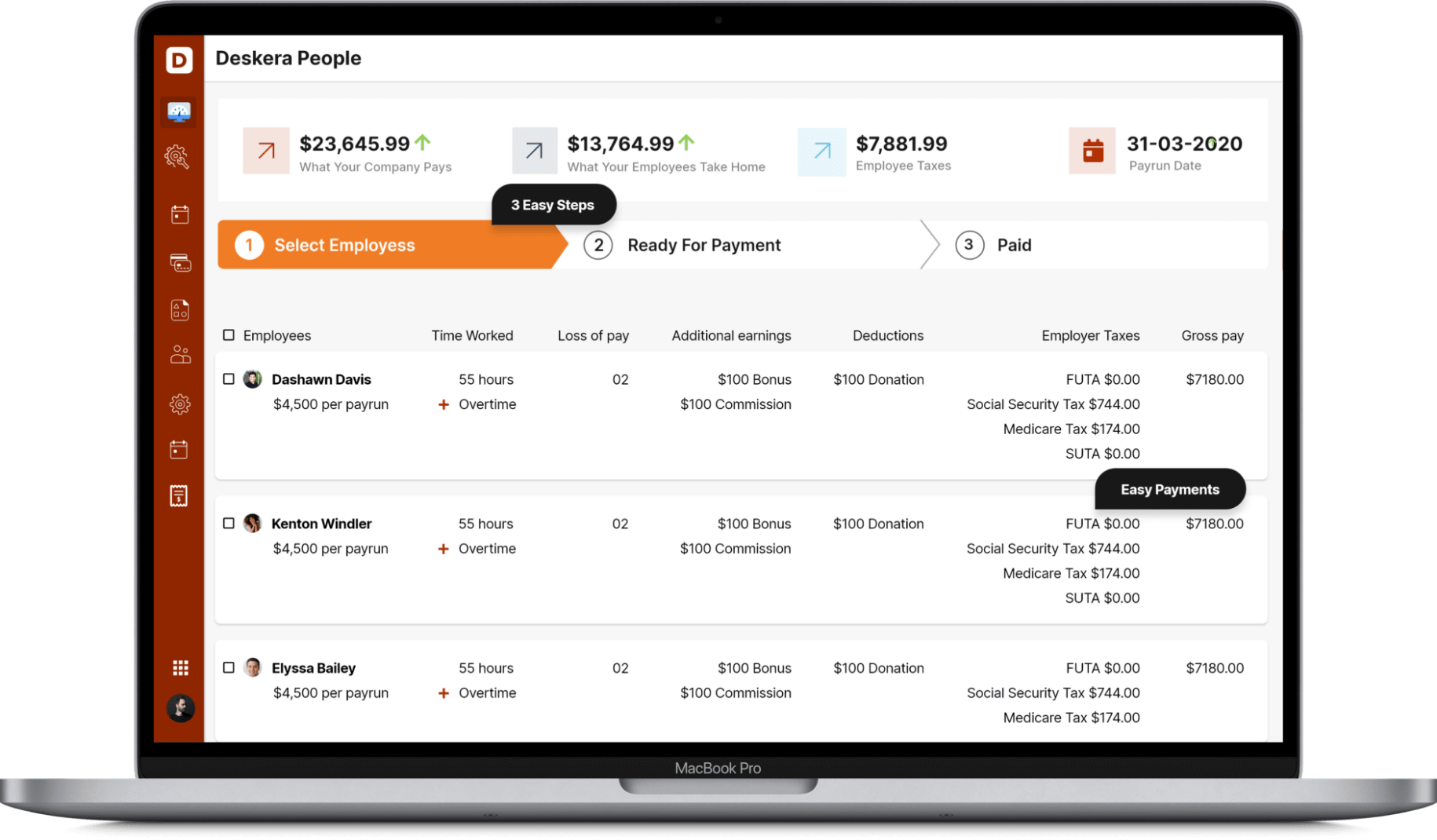More than half of jobs in India’s organized sector have one month or less notice period (54.1%). The analytics/ data science industry stands somewhere in between, with 37.5% of jobs having one month notice period. In West Bengal Factories Act you can learn about the notice of periods of work for adults and children. In this article, you can learn about the same.

This article covers the following:
- West Bengal Factories Act 1948
- Notice of periods of work for adults
- Notice of periods of work for children
- How can Deskera assist you?
West Bengal Factories Act 1948
The Factories Act is social legislation that has been enacted for occupational safety, health, and welfare of workers in the workplace. The State of West Bengal has formulated its rules as envisaged under the act and they are known as The West Bengal Factories Rules, 1958.
Section 61 in The Factories Act- Notice of Periods of Work for Adults
There shall be displayed and correctly maintained in every factory in accordance with the provisions of subsection 2 of section 108, a notice of periods of work for adults, showing clearly for every day the periods during which adult workers may be required to work.
The periods shown in the notice required by subsection 1 shall be fixed beforehand in accordance with the following provisions of this section and shall be such that workers working for those periods would not be working in contravention of any of the provisions of sections 51, 52, 54, 2,55, 56 and 58.
Where all the adult workers in a factory are required to work during the same periods, the manager of the factory shall fix that period for such workers generally. Where all the adult workers in a factory are not required to work during the same periods, the manager of the factory shall classify them into groups according to the nature of their work indicating the number of workers in each group.
For each group that is not required to work on a system of shifts, the manager of the factory shall fix the period during which the group may be required to work. Where any group is required to work on a system of shifts and the relays are not to be subject to predetermined periodical changes of shifts, the manager of the factory shall fix the periods during which each relay of the group may be required to work.
Where any group is to work on a system of shifts and the relays are to be subject to predetermined periodical changes of shifts, the manager of the factory shall draw up a scheme of shifts were under the periods during which any relay of the group may be required to work and the relay which will be working at any time of the day shall be known for any day.
The State Government may prescribe forms of the notice required by subsection and the manner in which it shall be maintained. In the case of a factory beginning work after the commencement of this Act, a copy of the notice referred to in the sub-section shall be sent in duplicate to the Inspector before the day on which work is begun in the factory.
Any proposed change in the system of work in any factory which will necessitate a change in the notice referred to in sub-section shall be notified to the inspector in duplicate before the change is made, and except with the previous sanction of the Inspector, no such change shall be made until one week has elapsed since the last change.
Register of adult workers
The manager of every factory shall maintain a register of adult workers, to be available to the Inspector at all times during working hours, or when any work is being carried on in the factory, showing-
(a) the name of each adult worker in the factory;
(b) the nature of his work;
(c) the group, if any, in which he is included;
(d) where his group works on shifts, the relay to which he is allotted; and
(e) such other particulars as may be prescribed: Provided that, if the Inspector is of opinion that any muster roll or register maintained as a part of the routine of a factory gives in respect of any or all the workers in the factory the particulars required under this section, he may, by order in writing direct that such muster roll or register shall to the corresponding extent be maintained in place of, and be treated as, the register of adult workers in that factory.
No adult worker shall be required or allowed to work in any factory unless his name and other particulars have been entered in the register of adult workers.] (2) The State Government may prescribe the form of the register of adult workers, the manner in which it shall be maintained, and the period for which it shall be preserved.

Notice of Periods of Work for Children
There shall be displayed and correctly maintained in every factory in which children are employed in accordance with the provisions of sub-section of section 108 a notice of periods of work for children, showing clearly for every day the periods during which children may be required or allowed to work.
The periods shown in the notice required by the subsection shall be fixed beforehand in accordance with the methods laid down for adult workers in section 61 and shall be such that children working for those periods would not be in contravention of the provisions of section 71.
The provisions of sub-sections (8), (9), and (10) of section 61 shall apply also to the notice required by subsection (1) of this section.
Register of child workers
The manager of every factory in which children are employed shall maintain a register of child workers, to be available to the Inspector at all times during working hours or when any work is being carried on in a factory showing-
(a) the name of each child worker in the factory,
(b) the nature of his work,
(c) the group, if any, in which he is included,
(d) where his group works on shifts, the relay to which he is allotted, and
(e) the number of his certificate of fitness granted under section 69.
3 (1A) No child worker shall be required or allowed to work in any factory unless his name and other particulars have been entered in the register of child workers.
(2) The State Government may prescribe the form of the register of child workers, the manner in which it shall be maintained, and the period for which it shall be preserved.
Hours of Work for Children
Hours of work to correspond with notice under section 72 and register under section 73.- No child shall be employed in any factory otherwise than in accordance with the notice of periods of work of children displayed in the factory and the entries made beforehand against his name in the register of child workers of the factory.
Annual Leave With Wages
The provisions of this Chapter shall not operate to the prejudice to any right to which a worker may be entitled under any other law or under the terms of any award 3 agreement (including settlement)] or contract of service.
Provided that if such award agreement (including settlement) or contract of service provides for a longer annual leave with wages than provided in this Chapter, the quantum of leave, which the worker shall be entitled to, shall be in accordance with such award, agreement or contract of service, but in relation to matters not provided for in such award, agreement or contract of service or matters which are provided for less favorably therein, the provisions of sections 79 to 82 so far as may be, shall apply.
The provisions of this Chapter shall not apply to workers in any factory of any railway administered by the Government, who are governed by leave rules approved by the Central Government.
Every worker who has worked for a period of 240 days or more in a factory during a calendar year shall be allowed during the subsequent calendar year leave with wages for a number of days calculated at the rate of.
(i) if an adult, one day for every twenty days of work performed by him during the previous calendar year;
(ii) if a child, one day for every fifteen days of work performed by him during the previous calendar year. Explanation
(a) any days of lay-off, by agreement or contract or as permissible under the standing orders;
(b) in the case of a female worker, maternity leave for any number of days not exceeding twelve weeks; and
(c) the leave earned in the year prior to that in which the leave is enjoyed; shall be deemed to be days on which the worker has worked in a factory for the purpose of computation of the period of 240 days or more, but he shall not earn leave for these days.
The leave admissible under this subsection shall be exclusive of all holidays whether occurring during or at either end of the period of leave.
(2) A worker whose service commences otherwise than on the first day of January shall be entitled to leave with wages at the rate laid down in clause
(i) or, as the case may be, clause
(ii) of sub-section
(1) if he has worked for two-thirds of the total number of days in the remainder of the calendar year.
If a worker is discharged or dismissed from service or quits his employment or is superannuated or dies while in service, during the course of the calendar year, he or his heir or nominee, as the case may be, shall be entitled to wages in lieu of the quantum of leave to which he was entitled immediately before his discharge, dismissal, quitting of employment, superannuation or death calculated at the rates specified in sub-section.
Even if he had not worked for the entire period specified in sub-section 1 or sub-section 2 making him eligible to avail of such leave, and such payment shall be made.
(i) where the worker is discharged or dismissed or quits employment, before the expiry of the second working day from the date of such discharge, dismissal, or quitting; and (ii) where the worker is superannuated or dies while in service, before the expiry of two months from the date of such superannuation or death.
In calculating leave under this section, a fraction of leave of half a day or more shall be treated as one full day's leave, and a fraction of less than half a day shall be omitted. If a worker does not in any one calendar year take the whole of the leave allowed to him under sub-section, as the case may be, any leave not taken by him shall be added to leave to be allowed to him in the succeeding calendar year.
Provided that the total number of days of leave that may be carried forward to a succeeding year shall not exceed thirty in the case of an adult or forty in the case of a child Provided further that a worker, who has applied for leave with wages but has not been given such leave in accordance with any scheme laid down in subsections (8) and (9) 1 or in contravention of sub-section (10) shall be entitled to carry forward the leave refused without any limit.
A worker may at any time apply in writing to the manager of a factory not less than fifteen days before the date on which he wishes his leave to begin, to take all the leave or any portion thereof allowable to him during the calendar year:
Provided that the application shall be made not less than thirty days before the date on which the worker wishes his leave to begin, if he is employed in public utility service as defined in clause (n) of section 2 of the Industrial Disputes Act, 1947 (14 of 1947). Provided further that the number of times in which leave may be taken during any year shall not exceed three.
If a worker wants to avail himself of the leave with wages due to him to cover a period of illness, he shall be granted such leave even if the application for leave is not made within the time specified in sub-section (6); and in such case wages as administrative under section 81 shall be paid not later than fifteen days, or in the case of a public utility service not later than thirty days from the date of the application for leave.
For the purpose of ensuring the continuity of work, the occupier or manager of the factory, in agreement with the Works Committee of the factory constituted under section 3 of the Industrial Disputes Act, 1947 (14 of 1947) or a similar Committee constituted under any other Act or if there is no such Works Committee or a similar Committee in the factory in agreement with the representatives of the workers therein chosen in the prescribed manner, may lodge with Chief Inspector a scheme in writing whereby the grant of leave allowable under this section may be regulated.
A scheme lodged under the sub-section shall be displayed at some conspicuous and convenient places in the factory and shall be in force for a period of twelve months from the date on which it comes into force, and may thereafter be renewed with or without modification for a further period of twelve months at a time, by the manager in agreement with the Works Committee or a similar Committee, or as the case may be, in agreement with the representatives of the workers as specified in sub-section, and a notice of renewal shall be sent to the Chief Inspector before it is renewed.
An application for leave that does not contravene the provisions of sub-section (6) shall not be refused unless refusal is in accordance with the sub-scheme for the time being in operation under sub-sections (8) and (9).
If the employment of a worker is entitled to leave under section 1 or subsection 2 as the case may be, is terminated by the occupier before he has taken the entire leave to which he is entitled, or if having his applied for and having not been granted such leave, the worker quits his employment before he has taken the leave, the occupier of the factory shall pay him the amount payable under section 80 in respect of the leave not taken, and such payment shall be made, where the employment of the worker is terminated by the occupier, before the expiry of the second working day after such termination and where a worker who quits the employment, on or before the next payday.
The unveiled leave of a worker shall not be taken into consideration in computing the period of any notice required to be given before discharge or dismissal.
Wages During Leave Period
For the leave allowed to him under 1 section 78 or section 79, as the case may be, a worker 2 shall be entitled to wages at a rate equal to the daily average of his total full-time earnings for the days on which he actually worked during the month immediately proceeding his leave, exclusive of any overtime and bonus but inclusive of dearness allowance and the cash equivalent of the advantage accruing through the concessional sale to the worker of food grains and other articles.
Provided that in the case of a worker who has not worked on any day during the calendar month immediately preceding his leave, he shall be paid at a rate equal to the daily average of his total full-time earnings for the days on which he actually worked during the last calendar month proceeding his leave, in which he actually worked, exclusive of any overtime and bonus but inclusive of dearness allowance and the cash equivalent of the advantage accruing through the concessional sale to the workers of food grains and other articles.
The cash equivalent of the advantage accruing through the concessional sale to the worker of food grains and other articles shall be computed as often as may be prescribed on the basis of the maximum quantity of food grains and other articles admissible to a standard family.
Standard family means a family consisting of a worker, his or her spouse, and two children below the age of fourteen years required in all three adult consumption units. Explanation Adult consumption unit means the consumption unit of a male above the age of fourteen years and the consumption unit of a female above the age of fourteen years and that of a child below the age of fourteen years shall be calculated at the rates of 0.8 and 0.6 respectively of one adult, consumption unit.
How Can Deskera Assist You?
As a business, you must be diligent with employee leave management. Deskera People allows you to conveniently manage leave, attendance, payroll, and other expenses. Generating pay slips for your employees is now easy as the platform also digitizes and automates HR processes.

Key Takeaways
- The Factories Act is social legislation that has been enacted for occupational safety, health, and welfare of workers in the workplace.
- Where all the adult workers in a factory are required to work during the same periods, the manager of the factory shall fix those period for such workers generally.
- For each group which is not required to work on a system of shifts, the manager of the factory shall fix the period during which the group may be required to work.
- The manager of every factory in which children are employed shall maintain a register of child workers.
Related Articles












